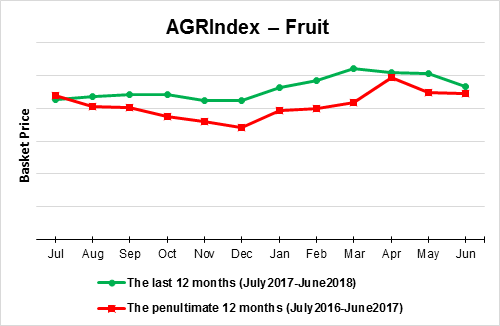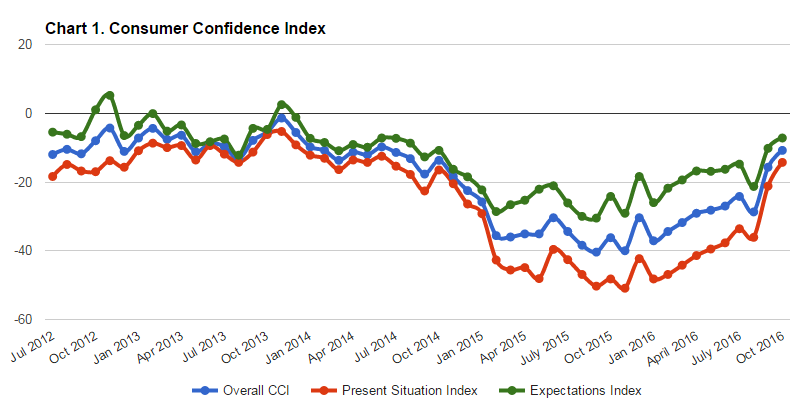
In June 2018, FRUIT prices continued their recent declining trend — the m/m change last month ...
Read more


ISET-PI has begun publication of a new product – the Budget Execution Monitor (BEM). The goal of the BEM is to forecast revenues and expenditures of the general government of Georgia for the cu...
Read more

Compared to September 2016, the overall CCI went up by 4.9 points, from -15.7 to -10.8. The present situation index increased by 6.9 points, from -21.2 to -14.3, and the expectation index went up by 3 points, from -10.2 to -7.2. It appears that a trend is continuing that has been ongoing since January (interrupted only by the interesting August swing-back, which we discussed in a blog article:). One may also see this as an extension of the upward trend that started even earlier, namely in September 2015.
The CCI has increased since August 2016, both for Tbilisi and for the rest of Georgia. In October 2016, the overall CCI has gone up among Tbilisians from -10.7 to -6.7 (4 points) and for the rest of Georgia from -19.6 to -13.8 (5.8 points). This difference is arguably not statistically significant.
As we discussed previously), there is evidence that it is not by coincidence that consumer confidence rises before elections. Elections are pivotal points in the political process, when the current government either gets confirmed, as happened this month, or replaced by the opposition. If we look at the pre-election movements of the CCI in different groups of the population, we can draw conclusions about their specific expectations regarding the elections.
Separately computing the present situation index of October 2016 for people with and without higher education, one can see that the index has improved for both groups, but with greatly different magnitudes: from -15.4 to -7.2 (8.2 points) for people with higher education and from -34 to -31.2 (2.8 points) for people without higher education. Apparently, people with higher education are substantially more optimistic about what the election will yield for them.
The overarching strategic question for Georgia is whether the reform agenda, which has been an emblem of this country since the Rose Revolution, will continue or not (and at what speed). Yet, not all people profit equally from reforms – the greater a person’s economic potential, the greater the gains he or she can make from modernization, increased dynamics, and the breakup of obsolete structures. The fact that the sentiments of well-educated people respond much more positively to the elections than the sentiments of the less educated, suggests that there is a belief that reforms will continue (or even speed up). As the survey was conducted a few days before the elections, this expectation does not depend on the election outcomes.
The decomposition of the CCI with respect to age tells a similar story.
As can be seen, the CCI for the group of people younger than 35 has increased, particularly as to questions that relate to the present situation. For these people, the present situation index went up by 10.7 points (from -20.3 to -9.6). For those older than 35, on the other hand, the change is much less pronounced, both for questions that refer to the present situation, as well as for questions that refer to the future. The present situation index for this group moved only by 3.4 points, from -21.7 to -18.3. As in the previous section, a straightforward interpretation is that younger people, who can benefit more from reforms and modernization of the society, expect more from the elections than older people. This observation also points to a societal belief that reforms will continue.
Finally, an interesting fact in the CCI of October 2016 is that the increase of the CCI is entirely driven by the female population!
For women, the present situation index increased exceptionally strongly, from -25.9 to -11 (+14.9 points), while the present situation index for males got worse (it moved from -16.8 to -18). Similarly, for the expectation index, we have a change from -13.4 to -5.8 (+7.6 points) for females, while here males also show a decline (from -7.2 to -8.9).
In the past, we have already discussed the gender differences in consumer confidence. However, we do not know the reason for the striking discrepancies in the perceptions of men and women that we saw in October. In part, it may have a mundane explanation: women are often hired during the election period to do jobs like distributing party advertisements, giving them additional labor and income. This effect, however, is not likely to account for the dramatic difference in male and female CCI that we observed.